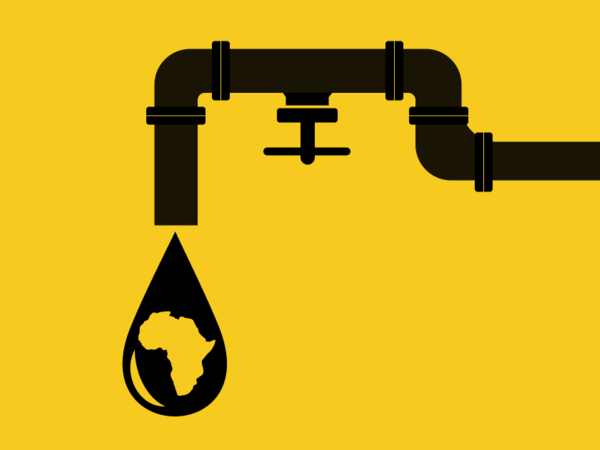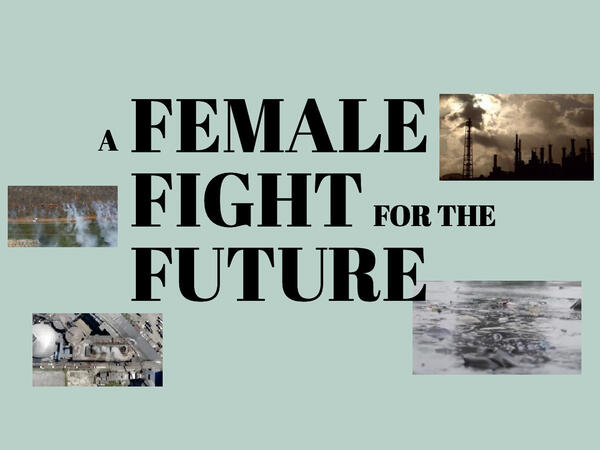EACOP pipeline through East Africa: Who profits from the new oil?
Standing in a lavish conference room in Kampala in April, the director of the Petroleum Authority of Uganda (PAU) pointed out executives who sit on stage. “My brother here from [TotalEnergies] represents a company that is worth $150 billion. Our friend there from CNOOC represents a company that is worth over $50 billion,” Ernest Rubondo says. “You can be sure that as a country something will rub off.”
Uganda is one of the poorest countries in the world. Entering the oil business is supposed to finally bring prosperity. In Nigeria, Africa’s biggest oil producers, these hopes were quashed. Uganda wants to do things differently. From 2025 crude oil is planned to run through the soon-to-be-built East African Crude Oil Pipeline, or EACOP for short. It’s expected to be the world’s longest heated pipeline.
Strong criticism comes from climate activists, but also environmentalists and human rights activists on the ground. The extraction area is one of the most biodiverse regions in Africa. Tens of thousands will be expropriated or resettled. In contrast, there are promises that oil wealth could finally help the country out of poverty - and out of economic dependence in almost all sectors. Again and again, the promising figures are conjured up by company representatives and President Yoweri Museveni’s government. It is about tax revenues, jobs and economic development.
How realistic are such promises? The issue goes beyond this small East African country. The invasion of Ukraine is fueling global interest in new oil-producing areas. Many of them are in poorer countries with authoritarian governments and weak environmental laws. But on the other hand, why should people there be denied the chance to escape poverty? Using company data, shareholdings and government reports, we reveal how realistic the promises are and who really benefits from the project. If you want to know who profits from an oil project, the first question is who owns the project? And where do most of the profits end up?
On its website, Norges Bank emphasizes that it wants to invest responsibly and that it sees climate change as a risk. Some companies with particularly high emissions have been excluded from their portfolio. Total, however, has not. Blackrock CEO Larry Fink also wrote to their shareholders in 2022 that decarbonizing the global economy would create the greatest investment opportunity of a lifetime. Still, Blackrock is holding on to its oil investments.
The profits from Ugandan oil are distributed all over the world via these international shareholders. A popular product of asset managers called exchange-traded index funds, or ETFs, can be found in numerous savings plans of Germans. When Total turns a profit, part of it flows into pensions in the USA and Europe.
So how about profits for Ugandans? In 2012, the Ugandan government negotiated a 15 percent share for oil projects that produce over 350 million barrels in the country. It’s something for Ugandans.
However, it’s too simple to ask only about a project’s shareholdings. Even a 15 percent share in the oil project would provide almost as much revenue as Uganda’s current national budget. Above all, an industrial project has the potential to create better jobs. But what kind of jobs, for who, and for how long?
These projections refer to all three projects. In a recent email to Tagesspiegel, Total stated there would be 80,000 direct and indirect jobs for the EACOP and Tilenga projects alone. About 3000 of these jobs are long-term. “The reality is the majority of the population we are working with is in favour of the projects. Tilenga and EACOP will help significantly improve their living conditions,” a spokesperson for Total wrote.
But what kind of value do temporary jobs bring to people? And how safe is it to calculate jobs that assume individuals and the government will spend their new income in the local economy? These numbers also say nothing about the nationality of these employees. Projections from Total and CNOOC commonly touted by Ugandan ministers say that about 57 percent of direct jobs will go to Ugandan employees.
Still, the Petroleum Authority of Uganda’s managing director Rubondo remains bullish about the project’s economic prospects. About a quarter of the $3.5 billion investment in the nascent oil and gas industry has been retained in the country in the past two decades, according to PAU. This is only a “good beginning,” though, Rubondo said at the oil convention in April, adding that Uganda aims to keep 40 percent of the full project value in the country.
Julius Byaruhanga, a lecturer at Cavendish University Uganda, is critical of this. “The 40 percent ambition of value creation in Uganda is not realistic,” he says. “Most companies in Uganda do not have the capacity to take on contracts of hundreds of millions of dollars.”
So the third essential question remains: which companies construct and operate the project on site? By delving into their company records – comprising registration certificates, annual share returns and other financial documents – doubts arise as to how realistic it is that a lot of knowledge and business will really be built locally. And whether some of the “Ugandan” companies really keep their profits in the country.
“There are companies whose ownership we do not know,” says Joseph Mukasa Ngubwagye, a coordinator at the Civil Society Coalition on Oil and Gas (CSCO), which advocates for transparency in the oil and gas industry. “They seem Ugandan, but the people who are owning them are actually not Ugandans.”
To find out who owns Ugandan companies you must visit the Uganda Registration Services Bureau in person and pay upfront for each company’s records. Many company records aren’t up-to-date or are incomplete, while the named owner on records may be different to the actual “beneficial owner”. This makes it even harder to verify the promises made by oil companies and the government.
For a company to be classified as Ugandan, 70 percent of its employees must be Ugandan and the company must also use Ugandan goods and services – according to a government regulation. Yet this allows companies to employ Ugandans as “cleaners, truck drivers and other low cadre jobs”, says Byaruhanga, while management and specialist technical positions are filled by foreigners. A truck driver in Uganda typically earns $200 per month, while an oil and gas engineer will typically take home a salary dozens of times as much as this.
Moreover, “Ugandan goods” do not actually have to be made in Uganda, only shipped via a Ugandan company, says Byaruhanga. Loopholes like this mean that PAU’s headline figures for how much Uganda’s local economy benefits may not reflect the reality on the ground, he Byaruhanga.
What role does nepotism play?
And even when companies are led by Ugandans, case studies already suggest that it’s society’s elites who will benefit most from Uganda’s oil. For example, Wesley Musinga, the financial manager of GCC Services is a son in law to Elly Karuhanga, according to Ugandan daily newspaper “New Vision”. Karuhanga is a former advisor to President Museveni and former Chairman of the Ugandan Chamber of Mines and Petroleum, according to “African Intelligence”. Karuhanga was also a president of Tullow Oil, which originally discovered oil in Uganda before selling its assets to Total.
Construction company Civtec was co-founded by Castro Taremwa in 2015. His father Barnabas Taremwa is a brother to Jovia Saleh, who is married to President Museveni’s brother Salim Saleh – according to Ugandan newspaper “Daily Monitor”. One company shareholder is Hussein Kashillingi, a former legal advisor to President Museveni.
When researching connections another interesting company comes up: Atacama Consulting. There is speculation from activists and NGOs that Atacama Consulting may have close ties to the government. A search of their company documents turned up unusually little. Atacama was contracted by Total to acquire land and resettle thousands of project-affected persons for the Tilenga project. According to the testimonies of displaced people, Atacama used intimidation tactics and delayed compensation payments. The same is true for Newplan Ltd and Infra Consulting Services, which handle land acquisition along the EACOP route in Uganda. Both companies are Ugandan-owned. Does this suggest that these companies are doing the dirty work for the big international players?
Of the one hundred contracts awarded by PAU in 2021 and the first quarter of 2022 less than a fifth of the contract value went to Ugandan companies – according to slides presented by PAU’s director at the oil convention. Part of the value of these major contracts will be further subcontracted to Ugandan companies as work begins, said Gloria Sebikari, PAU’s public relations manager. “All contractors include a national and community content plan with their bid,” she says. By law, sixteen sectors are reserved for Ugandan companies – including accommodation, catering, security, construction and land surveying, among others.
The loopholes
But if an international company is unable to find a Ugandan company with the capacity to fulfil the contract, they can hire companies from elsewhere. PAU’s ambition to keep 40 percent of the oil project’s value in the country could fail because of this, suspects a lawyer and industry expert who wishes to remain anonymous for fear of losing his job, but is known to the Tagesspiegel. Supply chain problems have led the cost of EACOP to spiral from $3.5 billion to $5 billion in recent months. As the costs of the project swell, and pressure increases to get first oil flowing, the risk of Ugandan companies losing out becomes greater, the industry expert explained. Tried and tested international companies can make a case to step in and gather scarce resources from an ever-tighter world market.
What remains is the revenue that the state will make from their share of the oil. But recent legislative changes mean that the Uganda National Oil Company can now spend oil revenue without the parliamentary checks required by Uganda’s central Petroleum Fund. This Fund aims to avoid the “oil curse” – whereby oil wealth creates less economic growth than it should – by only allowing oil money to be spent on development-related investments. UNOC can now circumvent this, and even borrow money against future oil revenues. And there is another issue. According to the Ugandan newspaper “The Daily Monitor“, there are already signs that the government has diverted money from the fund to close general budget gaps. It’s a risky situation, says the anonymous lawyer. “Given the level of corruption, how can we trust an institution that manages millions of dollars in our name?”









